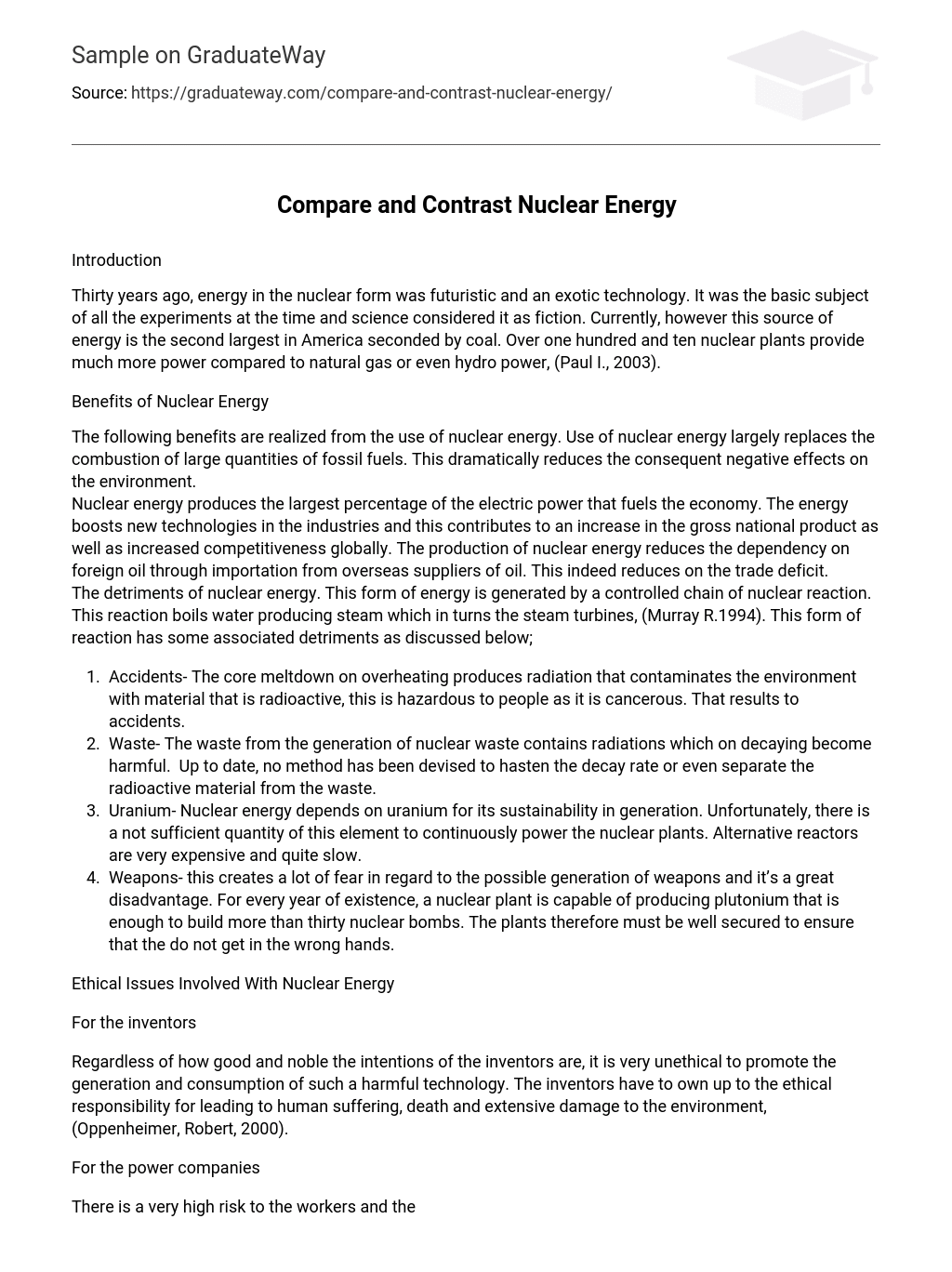Introduction
Thirty years ago, nuclear energy was considered a futuristic and exotic technology. It was the subject of many experiments, but science mostly saw it as fiction. Today, however, nuclear energy is the second-largest source of energy in America after coal. More than one hundred and ten nuclear plants provide much more power compared to natural gas or even hydro power (Paul I., 2003).
Benefits of Nuclear Energy
The use of nuclear energy has several benefits. One of the most significant advantages is that it replaces the combustion of large quantities of fossil fuels, which dramatically reduces negative environmental effects.
Additionally, nuclear energy produces the largest percentage of electric power that fuels the economy. This boosts new technologies in industries and contributes to an increase in gross national product as well as increased global competitiveness. The production of nuclear energy also reduces dependency on foreign oil by decreasing importation from overseas suppliers, ultimately reducing trade deficits.
However, there are also detriments to using nuclear energy. This form of energy is generated by a controlled chain reaction that boils water producing steam which turns steam turbines (Murray R., 1994). These reactions have associated detriments discussed below:
- Accidents – Core meltdowns caused by overheating produce radiation that contaminates the environment with cancerous radioactive material, resulting in accidents.
- Waste – The waste generated from nuclear energy contains radiation that becomes harmful as it decays. To date, no method has been devised to hasten the decay rate or separate the radioactive material from the waste.
- Uranium – Nuclear energy relies on uranium for sustainability in power generation. Unfortunately, there is an insufficient quantity of this element to continuously power nuclear plants. Alternative reactors are expensive and slow.
- Weapons – The possibility of generating weapons creates fear and is a significant disadvantage. For every year of existence, a nuclear plant can produce enough plutonium to build more than thirty nuclear bombs. Therefore, plants must be well secured to ensure they do not fall into the wrong hands.
Ethical Issues Involved with Nuclear Energy
For the Inventors
Despite the good and noble intentions of inventors, promoting the generation and consumption of harmful technology is highly unethical. Inventors must take responsibility for the ethical implications that result in human suffering, death, and extensive damage to the environment (Oppenheimer, Robert, 2000).
For Power Companies
Producing nuclear energy poses a significant risk to both workers and the general public. However, there is still debate surrounding this issue. Some argue that using coal-fired plants is more likely to result in fatalities.
For the Users
Nuclear energy can be dangerous and hazardous when exposed to living tissue. The radiation can move through various pathways into the environment, including the food chain, atmosphere, and water. Radioactive materials may enter the human body through skin contact, inhalation, ingestion, and other pathways. Exposing end-users to such risks and health hazards is unethical (Trudeau, P. 2001).
There are differences in the arguments for using nuclear energy and leaded gasoline. Leaded gasoline was once thought to be close to depletion, but it has been confirmed that it is becoming more abundant and sustainable due to international market liberalization, technological advancements, and increased investment. However, for nuclear energy sources to achieve similar success in today’s competitive markets, there must be a focus on improving technology (Pentreath, R.J., 1999).
Conclusion
The generation of nuclear energy is a new technology that has received various reactions from all sides of the globe. While it is deemed advantageous and beneficial, nuclear energy can also be detrimental and hazardous, especially during its generation and from the resulting waste. Various ethical issues arise regarding the generation and use of nuclear energy, which have been discussed above.
References
- Paul, I. (2003). Energy and the Environment. Van Nostrand Reinhold: New York.
- Murray, R. (1994). Understanding Radioactive Waste. Battelle Press: Columbus, Ohio.
- Oppenheimer, Robert (2000). The Open Mind. Simon and Schuster: New York.
- Pentreath, R.J. (1999). Nuclear Power, Man and the Environment. Taylor and Francis LTD: London.
- Trudeau, P. (2001). Energy for a Habitable World. Crane Russak: New York.





